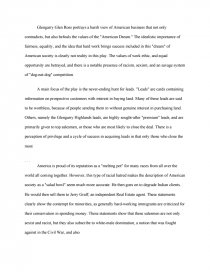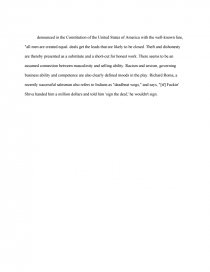Glengarry Glen Ross
Essay by review • March 20, 2011 • Essay • 392 Words (2 Pages) • 1,408 Views
Glengarry Glen Ross portrays a harsh view of American business that not only contradicts, but also befouls the values of the "American Dream." The idealistic importance of fairness, equality, and the idea that hard work brings success included in this "dream" of American society is clearly not reality in this play. The values of work ethic, and equal opportunity are betrayed, and there is a notable presence of racism, sexism, and an savage system of "dog-eat-dog" competition.
A main focus of the play is the never-ending hunt for leads. "Leads" are cards containing information on prospective customers with interest in buying land. Many of these leads are said to be worthless, because of people sending them in without genuine interest in purchasing land. Others, namely the Glengarry Highlands leads, are highly sought-after "premium" leads, and are primarily given to top salesmen, or those who are most likely to close the deal. There is a perception of privilege and a cycle of success in acquiring leads in that only those who close the most
. . .
America is proud of its reputation as a "melting pot" for many races from all over the world all coming together. However, this type of racial hatred makes the description of American society as a "salad bowl" seem much more accurate. He then goes on to degrade Indian clients. He would then sell them to Jerry Graff, an independent Real Estate agent. These statements clearly show the contempt for minorities, as generally hard-working immigrants are criticized for their conservation in spending money. These statements show that these salesmen are not only sexist and racist, but they also subscribe to white-male domination, a notion that was fought against in the Civil War, and also
denounced in the Constitution of the United States of America with the well-known line, "all men are created equal. deals get the leads that are likely to be closed. Theft and dishonesty are thereby presented as a substitute and a short-cut for honest work. There seems to be an assumed connection between masculinity and selling ability. Racism and sexism, governing business ability and competence are also clearly defined moods in the play. Richard Roma, a recently successful salesman also refers to Indians as "deadbeat wogs," and says, "[if] Fuckin'
...
...

